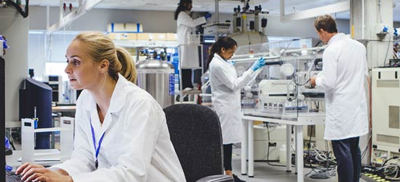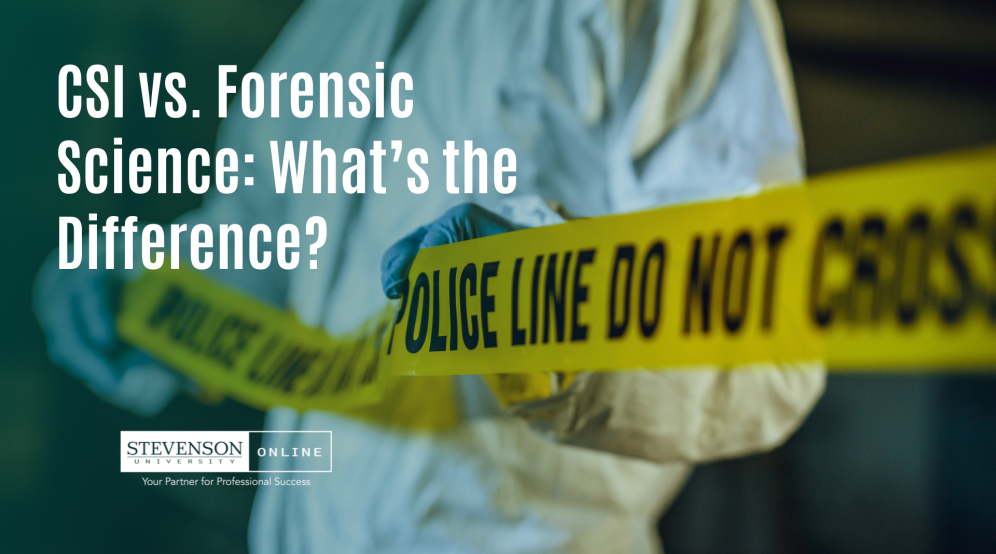Crime Scene Investigation (CSI) and Forensic Science are two terms that are often used interchangeably, but they actually refer to different aspects of the investigation and analysis of crimes.
Although they share similar goals, the specific tasks performed by forensic scientists and Crime Scene Investigators differ based on their distinct roles in the investigation process. It is important to understand the differences between these two careers, in order to determine which path to pursue.
This article provides an overview of CSI vs. Forensic Science, specifically what forensic scientists and Crime Scene Investigators do, the distinctions between the two roles, and offers tips for choosing between these two career paths.
What is Crime Scene Investigation (CSI)?
Crime Scene Investigation (CSI) is a field of forensics that involves the examination and analysis of physical evidence collected from a crime scene. CSI professionals gather, process, and analyze evidence such as DNA, fingerprints, and fibers to help law enforcement solve crimes.
In order to become a Crime Scene Investigator, a degree in CSI or a related field is typically required. While some agencies may hire individuals with only a high school diploma and relevant work experience, most employers prefer candidates who hold a bachelor’s or master’s degree in Crime Scene Investigation.
In addition to a degree needed for CSI , on-the-job training is often required to become proficient in the various techniques and technologies used in crime scene investigations.
What is Forensic Science?
Forensic science is a broad field that encompasses a variety of scientific disciplines used to investigate and solve crimes. While CSI focuses on the collection and analysis of physical evidence at a crime scene, forensic science is a much wider field that encompasses many different areas, such as biology, chemistry, and more.
In order to become a forensic scientist, a degree in forensic science or a related field is typically required. However, unlike CSI, forensic science roles require a science background, like chemistry or biology. The specific requirements may vary depending on the specialty within the field, as well as the specific employer.
Overall, forensic science and CSI are closely related, but while CSI focuses on the gathering and analysis of physical evidence at a crime scene, forensic science encompasses a wider range of scientific techniques and specialties used to analyze and interpret evidence in order to solve crimes.
Are forensic science and CSI the same?
CSI vs. forensic science, are they the same? Forensic science and crime scene investigation are related fields, but they are not exactly the same. Forensic science is a broad field that includes many different specialties whereas CSI focuses on the collection and analysis of physical evidence at a crime scene.
While both forensic science and CSI involve the analysis of physical evidence in order to solve crimes, the roles and responsibilities of forensic scientists and CSI professionals are different.
Forensic scientists may work in a lab, analyzing evidence that has been collected by a Crime Scene Investigator or other law enforcement personnel. CSI professionals, on the other hand, work in the field, collecting and analyzing physical evidence at the crime scene.
Overall, Forensic Science and Crime Scene Investigation are related fields, but they represent different stages of the investigation process, with forensic scientists analyzing evidence in a lab and CSIs collecting and analyzing evidence at the crime scene.
Similarities between Forensic Science and Crime Scene Investigation
Forensic science and crime scene investigation are two distinct fields with different roles and responsibilities, but they share some similarities in terms of their focus on analyzing physical evidence to solve crimes.
Some similarities are:
- Both fields involve the analysis of physical evidence, such as fingerprints, DNA, blood, and other trace evidence, in order to solve crimes.
- Both fields are important in providing evidence to law enforcement to help identify suspects and build a case against them.
- Both fields require a high level of attention to detail and the ability to think critically and solve problems.
- Both fields may involve working closely with other law enforcement personnel, such as detectives and prosecutors, to gather and analyze evidence in a timely and accurate manner.
What is the difference between CSI and forensic science?
Although CSI and forensic science share some similarities like the ones mentioned above, there are also important differences between the two fields that set them apart in terms of their focus, responsibilities, and methods.
| Aspect | Crime Scene Investigation (CSI) | Forensic Science |
| Education | High school diploma/GED, associate’s degree (at minimum preferred) | Bachelor’s degree or higher |
| Training | On-the-job training | Extensive lab and field training |
| Job functions | Collect and analyze physical evidence at crime scenes | Analyze physical evidence in a laboratory setting |
| Work Environment | Field work, may work in law enforcement agencies | Primarily works in crime labs or medical examiner’s offices |
| Techniques | Photography, fingerprinting, and other physical evidence collection and analysis | DNA analysis, toxicology, and other specialized lab techniques |
| Testimony | May testify in court about crime scene evidence | May testify in court about laboratory analysis findings |
| Career options | Crime scene investigator, crime scene technician, ballistics expert, criminal profiler, criminalist, DNA analyst, medical examiner | Forensic scientist, forensic analyst, forensic toxicologist, forensic pathologist, digital forensic analyst, forensic accountant, forensic psychologist, forensic medical examiner |
Note: This chart provides general information about the fields of CSI and Forensic Science, but job requirements and functions depend on the specific agency or employer.
What is the difference between the CSI and forensic science programs offered at Stevenson University Online?
Stevenson University Online offers both a CSI and a forensic science master’s program, however, there are several key differences between the two graduate programs:
Program Focus: The CSI graduate program offered at Stevenson University Online is focused on the investigation and collection of physical evidence at crime scenes, while the forensic science program is focused on the analysis of physical evidence in a laboratory setting.
Job Functions: Graduates of the CSI program are prepared for roles in crime scene investigation and evidence collection, while graduates of the forensic science program are prepared for roles in forensic analysis, such as DNA analysis, toxicology, and ballistics.
Coursework: The CSI program coursework includes topics such as crime scene documentation, evidence collection, and forensic photography. The forensic science program coursework includes topics such as biology, chemistry, and laboratory techniques.
It’s important to note that the specific curriculum and program structure can vary between institutions, and students should carefully research and compare programs to determine which one best meets their career goals and interests.
Program Curriculum
The main difference between the two programs is their curriculum focus. The CSI graduate program is geared towards individuals who want to start their investigation at the crime scene and follow the evidence collection and processing until reporting their findings in court. It prepares students for roles in crime scene investigation and evidence collection.
On the other hand, our forensic science program curriculum is designed for students interested in the instrumentation, technology, and the relevant laws used to collect evidence and present it in court.
Program Prerequisites
The prerequisites for the graduate forensic science program and CSI program at Stevenson University Online differ slightly. Unlike our CSI program, the forensic science program requires the completion of coursework and/or a bachelor’s degree in a natural science field such as biology or chemistry.
Career Opportunities
Stevenson University Online’s graduate forensic science program and CSI program lead to different career paths. The CSI program prepares graduates for crime scene investigation, evidence collection, and forensic analysis, while the forensic science program trains students in laboratory analysis of physical evidence.
Overall, while both programs provide training in forensic science, they focus on different areas of expertise, and graduates of each program may pursue different career paths in the field.
Career Opportunities with a Masters in Crime Scene Investigation
Earning a master’s degree in CSI can greatly expand one’s knowledge and skill set, and potentially lead to a wider range of career opportunities in crime scene investigation.
Career opportunities with a masters in Crime Scene investigation may include crime scene investigators, forensic science technicians, forensic psychologists, forensic scientists, forensic pathologists, criminal investigators, or consultants for law enforcement agencies or private firms.
Graduates may also choose to work in research facilities or academic institutions, where they can conduct research on forensic science methods and techniques, or teach at the college level.
Learn More About Stevenson University’s Online Master’s Program in CSI
If you are passionate about criminal investigation and crime scene analysis, consider exploring Stevenson University’s online master’s program in CSI. Developed for working professionals, the Stevenson Crime Scene Investigation graduate program is offered fully online! We also have no GRE requirements and no application fees, we make it easy for professionals aspiring to earn a Master’s Degree in Crime Scene Investigation online.
Request more information here and discover how Stevenson University Online can help you balance the demands of life while meeting your educational and career goals.






